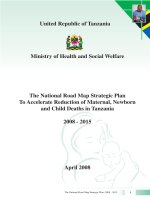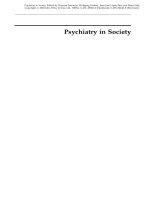Monday PM contemporary psychiatry in US OCT 2015 CTUMP version
Bạn đang xem bản rút gọn của tài liệu. Xem và tải ngay bản đầy đủ của tài liệu tại đây (400.77 KB, 11 trang )
Contemporary Psychiatry in US
1
Richard C. Veith, MD
Ashley Bouzis, MD
Psychiatry & Behavioral Sciences
University of Washington, Seattle, Washington, USA
Summary of Psychiatry Training in US
2
•
In the US, medical school requires 4 years of training after having usually completed 4 years of general
university education
•
Medical students are required to pass national competency (USMLE) exams after year 2 and year 4 for
graduation
•
Psychiatric specialty training (residency) requires 4 years of training following graduation from
medical school
•
Post-residency added-qualification, subspecialty fellowships are available in: child psychiatry (2 yrs),
geriatric psychiatry (1 yr), addiction psychiatry (1 yr), psychosomatics (consultation-liaison psychiatry)
(1 yr), forensic psychiatry (1yr). All have certification exams.
MS Year 2 Brain & Behavior Course
3
DAY 1
DAY 2
DAY 3
DAY 4
DAY 5
4 Hours
4 Hours
3 Hours
3 Hours
4 Hours
Quiz
Quiz
Quiz
Quiz
Quiz Cumulative
Week 1
Mood Disorders
Psychotic Disorders
Anxiety Disorders
Personality Disorders
Suicide
18 hrs
Antidepres-
Antipsychotics
Management
Somatization
Psychotherapy
sants
Movie Clips
Lithium
DAY 6
DAY 7
DAY 8
4 hours
2 Hours
2 hours
Quiz
Quiz
Week 2
Child Psychopath I and II
Delirium
Differential Diagnosis
8 hrs
Stimulants
Dementia
Final exam
Medical Student Psychiatry Clinical Clerkship
Goals and Objectives
4
All 3
rd
year medical students take a required 6-week psychiatry clinical clerkship consisting of 4 weeks
of inpatient psychiatry and 2 weeks of hospital-based consultation-liaison psychiatry
The overall goal of the clerkship is to provide a thorough introduction to Psychiatry through supervised
patient encounters, clinical teaching and a weekly structured didactic program.
UW Psychiatry Residency
4-year Specialty Training after Medical School
5
10 months inpatient
4 months hospital consultation services
4 months primary care (Medicine/Pediatrics)
2 months neurology
1 month emergency psych
12 months outpatient plus 3 years longitudinal clinic
2 months child psychiatry
1 month addictions
1 month geriatrics
"exposure" to community psych, forensics
Contemporary Psychiatry Practices in US
6
Inpatient treatment of seriously ill, suicidal, psychotic patients
Outpatient community mental health center care with socialization, case management,
medications, vocational support for those with chronic serious mental illness
Private practice or health care system outpatient care for less seriously ill individuals who can afford
it
Recent introduction of “collaborative care” or “integrated care”models to bring behavioral health
care into the general medical, primary care setting
Psychiatry in US – Pharmacotherapy
7
Much of the focus of care in inpatient services is on arriving at the correct diagnosis, keeping patients
safe from suicidal impulses or disturbed thinking in those who are psychotic
Most patients who are voluntarily hospitalized are depressed or experiencing a manic or psychotic
episode
There is much reliance (depend) on antipsychotic, antidepressant, and mood stabilizing medications,
such as lithium
Seriously depressed patients might require electroconvulsive therapy (ECT)
A typical length of hospital stay for inpatient units with voluntary patients is ~ 7 days.
Psychiatry in US – Cognitive Behavioral Therapy (CBT)
8
Theoretical model assumes that changing maladaptive thinking leads to change in affect and behavior
CBT techniques challenge thinking patterns and beliefs to replace "errors in thinking such as
overgeneralizing, magnifying negatives, minimizing positives and “catastrophizing”(dự báo tai ươn)
with more realistic and effective thoughts, thus decreasing emotional distress and self-defeating
behavior
These errors in thinking are known as cognitive distortions
CBT techniques help individuals take a more open, mindful, and aware posture toward them so as to
diminish their impact
Psychiatry in US – Dialectical Behavior Therapy (DBT)
9
Biện chứng
Medical Students at CTUMP
10
Open Discussion:
How was your experience in psychiatry coursework and clinical rotations?
What reasons might a CTUMP student have for going into psychiatry or not going into
psychiatry as a career choice?
What would help you get a better understanding of the challenges and opportunities in
psychiatry?
What might make it more attractive for a student to consider psychiatry as a career choice?
Thank You
11
James D. Ralston









